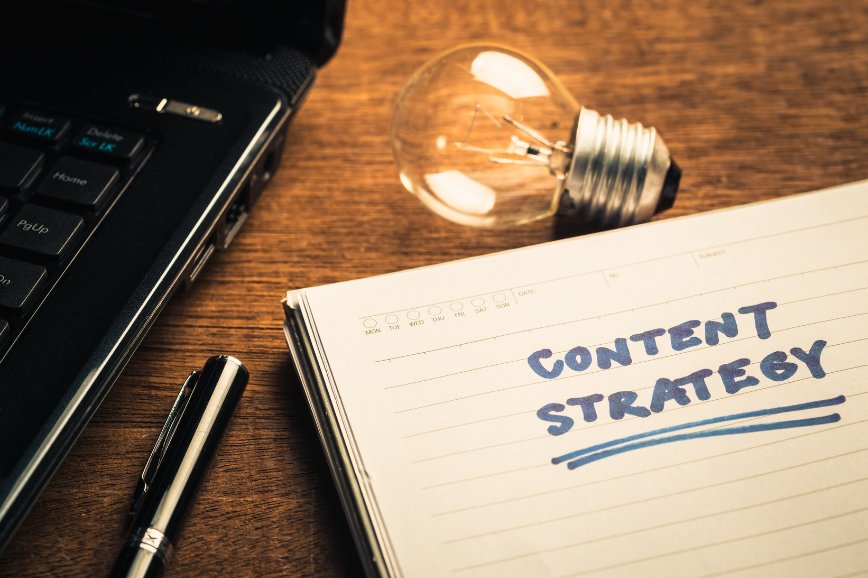Key Elements to Building a Powerful Content Marketing Strategy

Businesses use content marketing as a way to engage their audience and build brand loyalty. Content marketing can take many forms, from blog posts, articles, and social media updates to infographics and videos. With the right strategy in place, content marketing has the potential to drive traffic, increase conversions, and enhance brand recognition.
Whether you’re working with a performance marketing agency or handling your marketing efforts in-house, understanding the key elements of a content marketing strategy can help you achieve long-term success.
Quick Tip: Content marketing nurtures organic growth over time and can generate significant results at a low cost.
1. Define Your Goals
The first and most important step in building a powerful content marketing strategy is defining clear and actionable goals. What do you hope to achieve with your content? Do you want to grow website traffic, improve brand awareness, generate leads, or boost customer retention?
Your goals should align with your overall business objectives. Say you’re looking to increase sales, your content might include product-focused articles, videos, or affiliate marketing initiatives. If your goal is brand awareness, consider producing UGC (User Generated Content) engaging videos or blog posts that highlight your company mission and values. Defining specific goals will allow you to measure success and calibrate your strategy as needed.
Quick Tip: Don’t waste resources creating content that has no value for your company.
2. Know Your Audience
Once your goals are established, it’s time to dive deep into understanding your audience. Successful content marketing strategies always focus on the target audience—what they want, need, and how they consume content. Without knowing your audience, you can’t create content that resonates with them.
Start by creating buyer personas—fictional characters that represent the different segments of your audience. These personas should include demographic details such as age, gender, household income, job role and interests, as well as psychographics like their motivations, challenges, and pain points. The more you understand your audience, the more effective your content marketing will be.
3. Create High-Quality, Relevant Content
At the heart of any content marketing strategy is content itself. Creating high-quality, relevant content is key to building trust and engaging your audience. Content can come in many formats, including blog posts, articles, podcasts, or videos — and can be written in both the 1st or 3rd person. It’s important to choose the right format for your message and audience.
Incorporate topics that matter to your target audience. If your goal is to educate and inform, long-form blog posts and articles are an excellent way to take a deep dive into meaningful topics. If you’re looking to entertain, consider creating more dynamic content such as videos or interactive posts.
Consistent, first-rate content can help you build authority in your industry—critical for both short-term and long-term marketing success.
4. Optimize for SEO
While content is king, without proper optimization, it may not reach your target audience (or any audience at all). Search engine optimization (SEO) is an approach focused on making your content discoverable in search engines like Google. By including appropriate keywords and ensuring the content is well-structured, you can boost its visibility.
Start by conducting keyword research to understand what your audience is searching for. Use these keywords naturally within your content to improve your chances of ranking higher on search engine results pages (SERPs). Make sure your content is fast-loading, easy to navigate, and mobile-friendly. This will enhance both the user experience and SEO performance.
5. Leverage Video Advertising
Incorporating video advertising into your content marketing strategy can significantly strengthen your results. Videos are a powerful tool to connect with your audience. Whether it’s a short ad, a cooking tutorial, or an explainer video, video content often performs better than other types of content in terms of engagement and conversion rates. In fact, statistics show that viewers retain 95% of a message included in a video compared to 10% when reading it in text.
When it comes to building brand awareness, video advertising is especially effective as it allows for a more dynamic and personal connection with your audience. You can showcase your products, tell stories, or even educate your audience, basically be an influencer. Social media platforms like Instagram, Facebook, and YouTube are ideal spaces to share these videos. Plus, they offer targeting options to ensure your content reaches the right people.
6. Promote Your Content
Creating great content is only half the battle. To build a successful content marketing strategy, you need to promote that content across various channels. Don’t rely solely on organic traffic—leverage social media, email marketing, and even paid advertising to amplify your message.
Affiliate marketing is an exceptional way to expand your reach. By partnering with affiliates who have their own audiences, you can tap into new customer segments without spending significant amounts on ads. Affiliates promote your content or products, and in return, you can earn a commission for any sales generated. This mutually beneficial arrangement helps grow both your audience and revenue.
7. Measure and Analyze Performance
A powerful content marketing strategy is not static—it evolves over time. To optimize your content and refine your strategy, you need to measure and analyze your performance regularly. Use analytics tools to track key metrics like traffic, engagement, lead generation, and conversion rates.
This data will help you identify what’s working and what needs improvement. For example, if you notice that video content is driving higher engagement than blog posts, it’s smart to invest more resources into creating videos. If certain keywords are driving traffic, optimize future content by including similar terms.
8. Build Relationships and Trust
The most effective content marketing strategies build long-term relationships and trust with your audience. Consistency, transparency, and authenticity are key to creating a loyal following. When your audience feels that they can trust your brand, they’re more likely to become repeat customers and even brand advocates.
Engage with your audience on social media, respond to comments on your content, and ask for feedback. This two-way communication can help you improve your content and solidify your audience relationship.
9. Keep Current With Industry Trends
The digital marketing world is in constant flux. Innovative technologies, tools, and strategies are constantly evolving. Remaining current with the latest trends in digital marketing, content creation, and SEO can give you a competitive edge and keep your strategy fresh.
Consider following thought leaders in the content marketing and digital marketing space. Subscribe to relevant blogs, participate in webinars, and attend industry conferences to stay informed. The more you know about the latest developments, the more effectively you can adapt your strategy and stay ahead of the competition.
Final Thoughts
Building a powerful content marketing strategy doesn’t happen overnight. It requires planning, consistency, and ongoing refinement. By defining your goals, understanding your audience, creating high-quality content, optimizing for SEO, and promoting your work, you can lay a solid foundation for success. Add video advertising, affiliate marketing, sponsored content and regular performance analysis into the mix, and you’ll create a content strategy that helps you build long-term relationships with your audience and achieve measurable results.
Whether you work with a performance marketing agency or handle things in-house, these core elements of content marketing will guide you toward creating a strategy that drives engagement, growth, and success.
How GeistM Can Help Accelerate Your Content Marketing Strategy
At GeistM, we specialize in helping brands accelerate their content marketing strategies and turn key components into results-driven actions. With our in-house team of content experts and extensive industry experience, we collaborate with you to create outstanding engaging content that amplifies your brand’s voice and connects with your target audience. Whether optimizing for SEO, developing video campaigns, or enhancing your digital marketing efforts, we ensure every element of your strategy works seamlessly to fuel growth.
As we venture into 2025, partnering with us is your opportunity to build a content marketing strategy that truly delivers. Contact GeistM today to see how we can make a real impact on your marketing goals.

